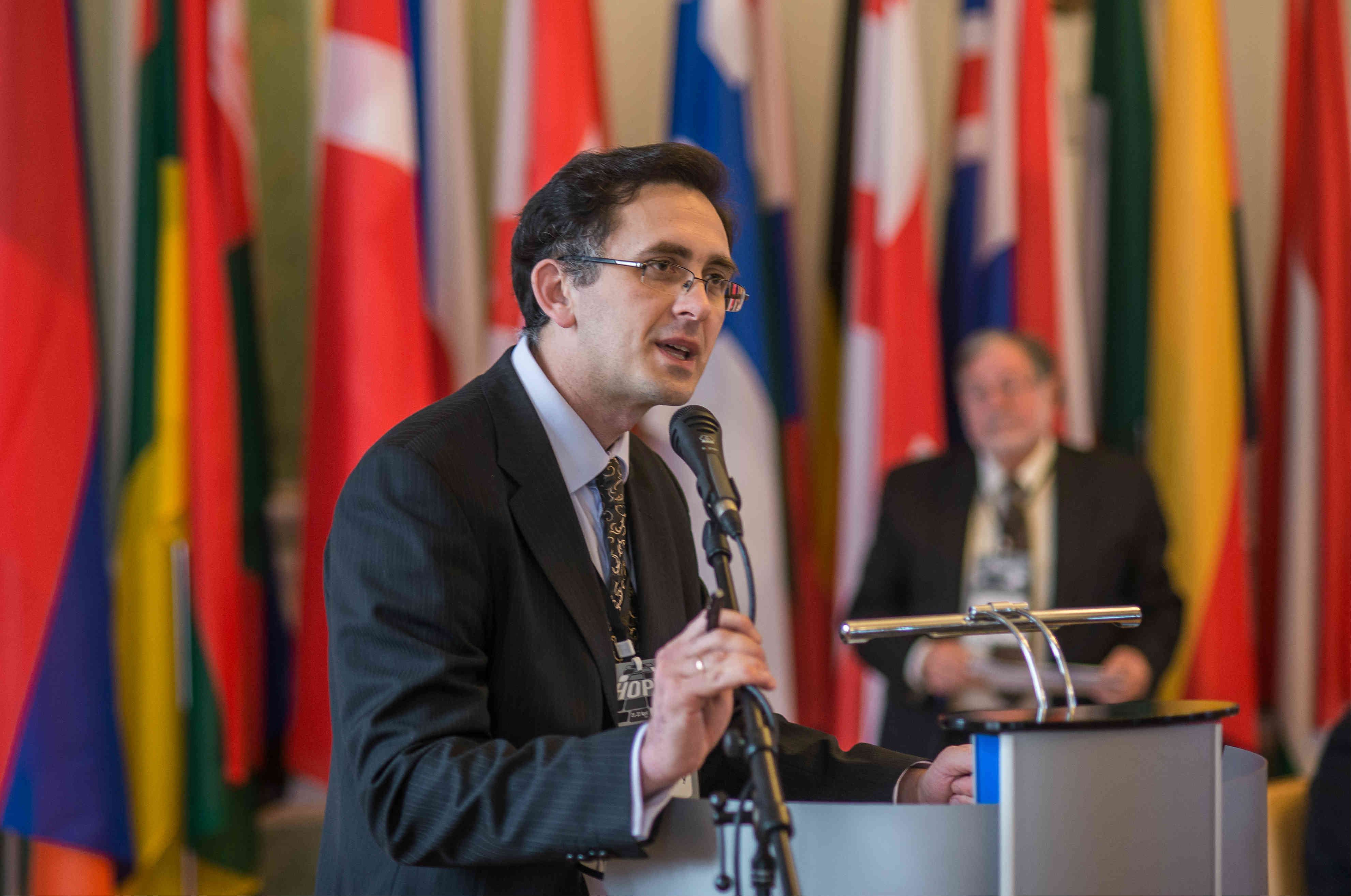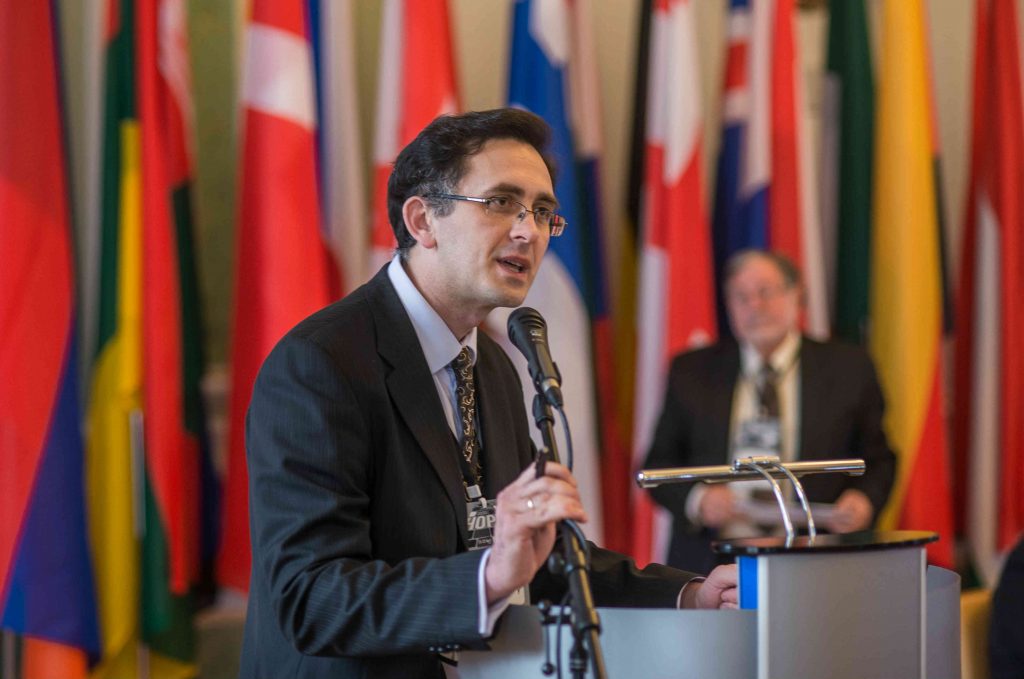 Until very recently, Ukrainians predominantly spoke a language of identities, differentiating between people from western Ukraine and people from the eastern part of the country, Ukrainian speaking versus Russian speaking, Greek Catholics versus Orthodox. But what was powerfully witnessed during the Euromaidan was the emergence of a new modality of communication that we might call a language of values. It was spontaneously born from the spirit of solidarity of the Maidan community.
Until very recently, Ukrainians predominantly spoke a language of identities, differentiating between people from western Ukraine and people from the eastern part of the country, Ukrainian speaking versus Russian speaking, Greek Catholics versus Orthodox. But what was powerfully witnessed during the Euromaidan was the emergence of a new modality of communication that we might call a language of values. It was spontaneously born from the spirit of solidarity of the Maidan community.
The very name “Revolution of Dignity” reflects our growing ability to communicate in a language that transcends the differences among us. The Euromaidan community was extremely diverse, and the Maidan became a place where representatives of multiple identities, each speaking in his or her own voice, met and collaborated.
There is another major achievement of the Revolution of Dignity. It released Ukrainian society from any obligations demanded by its previous post-Soviet social contract, allowing Ukraine to resolutely say goodbye to its past while still struggling to open itself up to the uncertainties of the future. We have opened ourselves up to a new social contract founded on the respect for human dignity.
Is there a role for reconciliation in what we are living through? There is not much talk about reconciliation in Ukraine these days, apart from limited intellectual circles. People tend to be silent about it, feeling suspicious about the idea. For the most part, the concept of reconciliation is perceived as a defeat, a stepping back and giving up the efforts of defending the county.
Such an attitude is understandable and should not be underestimated. In the eyes of a majority of Ukrainians, we are living in an era where what we need most is our shared commitment to change, action, and sacrifice, and a determination to win in struggles with war and endemic corruption. Reconciliation doesn’t seem to fit in with this agenda.
In part, that may be the result of people’s intuitive understanding of how easily reconciliation could be turned into propaganda. Reconciliation could become merely a cover for an ideology that could be widely and aggressively advertised with a very primitive message echoing the famous, “Don’t worry be happy,” while in truth it would be simply another Kremlin-backed element of Russia’s hybrid war. For example, the “Russian world” is a construct which integrates a number of eternal and solemn Christian ideas, while instrumentalizing them in such way as to serve a distinct, non-Christian purpose. I can imagine that the concept of reconciliation could be willfully exploited for some purposes opposite to authentic reconciliation on a massive scale.
Additionally, Russian President Vladimir Putin has enough nerve and ambition to strike first in a game. I am sure he could launch a reconciliation phase of his geopolitical game at the same moment as he decided that a military phase should be put on hold. Putin has lost already twice against Ukraine when Ukrainians took a stand to protect their freedom and dignity: the 2004 Orange Revolution and the 2014 Revolution of Dignity. He would not allow it a third time.
So however paradoxical it might sound, the next serious battle will be over the concept of reconciliation, and its possible impact. This is where Ukraine might have a chance to play its unique role again by strategically cultivating a reconciliation initiative.
After all, even the smallest hint of authentic reconciliation is, in the eyes of the current Russian political leadership, a threat that can blow apart their system. Putin’s system is built on the opposite to reconciliation: conflicts, wars, depravations, corruption, falsifications, and terrorism are all elements of Russia’s anti-reconciliation menu.
It goes as follows: After it has established a conflict, the Kremlin’s main intention is to manage the conflict to its advantage. At some point, it starts playing a role of a peacemaker, but one who only brings a kind of spiritual anesthesia so that people’s wounds hurt less but do not disappear over time. That is a perfect situation if your policy is about instrumentalizing others’ sufferings in order to accumulate power and wealth, while simultaneously failing to modernize your own country or cultivate basic freedoms.
A key part of the Russian hybrid war against Europe is the non-military element, which aims to spread chaos throughout the social and political structures of the EU. To the extent to which the situation in Europe worsens, making Europeans more inclined to find relief by accepting the Russian concept of a common space, the Kremlin might decide to diversify its Ukrainian strategy by promoting its version of Russian-Ukrainian “reconciliation.”
What are the chances that Putin could be caught by a Ukrainian surprise for a third time—this time by the power of genuine reconciliation that could change the rules of the game? The chances are as high as they have ever been. Ukraine has proved its commitment to freedom and dignity, and Ukrainian civil society is growing stronger.
What may not yet be visible is the growing awareness of reconciliation among Ukrainian religious leaders and intellectuals. A slowly growing interest, attentiveness, and sensitivity toward the challenge of reconciliation signals the birth of a potentially transformative social dynamic.
Similar to how the Euromaidan became a maturity test for Ukrainian civil society, the challenge of reconciliation could become a leveraging opportunity for witness, service, and leadership on the part of Ukrainian religious communities. Ukrainian Christianity has the potential to play the leading societal role in carefully distilling, articulating, and embodying the idea of an authentic reconciliation. A message of this sort would be most powerful if Ukrainian churches and religious communities would take concrete steps in introducing reconciliation practices and models within their own groups.
I would like to conclude by citing two recent and unprecedented open letters signed by groups of Orthodox and Greek-Catholic clergy and intellectuals. The letters are equally beautiful and moving in their humility, brotherly attitude, and courage in transcending their own fears, the risk of misunderstandings, and the pressure of historical burdens.
The occasion for the letters was the seventieth anniversary of the so-called “Lviv Sobor of 1946,” at which under pressure from the Soviet government, the Orthodox Church of Russia forcefully took over the Ukrainian Greek Catholic Church under its jurisdiction.
A first letter, entitled “The Orthodox Appeal for Recognition of the 1946 Lviv ‘Synod’ as a Sham,” was signed and made public on March 13 by an international group of prominent Orthodox Christian believers. In it, they “assure the Ukrainian Greek Catholic Church of our solidarity, of our prayers for all the innocent victims of this Church who were imprisoned, tortured, deported and assassinated by the Soviet government with the complicity of the Patriarchate of Moscow. We humbly ask their pardon for all the injustices they have suffered under the cover of the Orthodox Church.”
On March 17, in response, a letter entitled “A Word to the Orthodox Brothers and Sisters Who Signed the Statement on the 70th Anniversary of the So-Called ‘Lviv Sobor of 1946’” was signed by His Beatitude Sviatoslav, head of the Ukrainian Greek Catholic Church, as well as a group of leading Ukrainian intellectuals. It reads, “Orthodox brothers and sisters, your letter helped us to transcend our pain and experience this sad anniversary of the pseudo-sobor with a sense of hope. We hope that our mutual appeals, to which our other co-religionists are free to join, will be the foundation for our future work together. May the Holy Spirit heal our historical wounds and guide us toward forgiveness, reconciliation, and true union in Christ, who by His resurrection conquers death and gives us all hope for eternal life.”
It is only the authenticity of gestures like these, born through the dynamics of asking for pardon and forgiveness, which would allow Ukrainian society at large to appreciate reconciliation as an important step toward a lasting peace in Ukraine and in the region—as well as to become immune to any ideological strategies that merely imitate reconciliation.
Volodymyr Turchynovskyy is Director of the International Institute for Ethics and Contemporary Issues at the Ukrainian Catholic University in Lviv, Ukraine. This article is an abridged version of a longer speech he gave at Georgetown University’s Berkley Center on April 1, 2016.
Image: Volodymyr Turchynovskyy, director of the International Institute for Ethics and Contemporary Issues at the Ukrainian Catholic University in Lviv, speaks about reconciliation at a conference in Kyiv on April 21, 2015. Credit: Oleksandr Laskin for UCU
